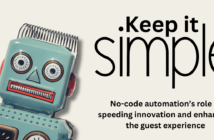by Todd Sabo, President – North America, RMS Hospitality Solutions
Hospitality’s near decade of RevPAR expansion has been an incredible time for lodging brands and hotel technology startups to grow, but now is not the time to sit back and enjoy the ride. Although no one can predict exactly when this growth streak will end, there is consensus among the industry that a downturn is coming.
In preparation for this downturn, I anticipate the transition from on-premise hotel technology to the cloud will not only continue but accelerate. Adopting cloud-based software and systems will make your brands and your people better equipped to scale and innovate, the basis for operational resilience.
Operational resilience is key when making decisions and necessary adjustments in response to market shifts. It’s not just being reactive to industry ups and downs, but it’s also finding ways to create demand for your properties through data-driven marketing and customer service.
Hoteliers focusing on operational resilience will be able to take full advantage of our current boom times and find efficient ways to increase rate, RevPAR, and profitability. More important, they’ll be the ones whose properties will still make money, increase market share, and generate breakthrough ideas when a cyclical downturn inevitably hits our industry.
Integration is fundamental to operational resilience. It’s a term your head of IT constantly uses, but integration matters just as much when looking at your staff and the customer journey as it does when looking at your systems.
Integrate Hotel Technology
The most obvious place for integration is your hotel’s technology stack. If your property management and revenue management systems, channel manager, and booking engine are all run in the cloud with software-as-a-service applications, you’re keeping pace with leaders in the industry.
If you can’t seamlessly share data across the PMS, CRS, channel manager, and booking engine, you’re going to waste valuable time and open your company up to devastating errors.
With an integrated tech stack, all the data you need for strategic action is instantly accessible. You reduce the risk of double or dropped bookings and accounting errors, and increase data continuity across your property. An all-in-one PMS can show you the heartbeat of your hotel, with reporting that tracks pace, pickup, and how occupancy and revenues compare to last year and the forecast.
Modern cloud-based systems can automate crucial processes and provide real-time visibility into your hotel’s operations. The more “set it and forget it” features your PMS provides, the more efficient and resilient your property will be. Have a plan for what to do when economic conditions cause a change in demand, and be ready to execute when the data you track indicate those changes have occurred.
Something to watch out for when choosing new pieces in your tech stack are “hybrid” cloud solutions. With many hybrid systems, an application may be sitting on a server in the cloud, but you’ll need a VPN client to tap into it. The software is not as flexible or scalable in these situations as some vendors would have you believe.
Internalize Teamwork
Integration among your team members and decision-makers is extremely important. Cloud applications woven together in one platform can help your staff work better together and collaborate more.
At the strategic level, make sure every single person internalizes their part in maximizing profitability. The revenue managers and sales and marketing teams bring in the business, and the general manager along with operations and housekeeping staff make sure those guests come back.
Communication is what optimizes day-to-day operations. That’s why it’s important for hotel technology platforms to feature a built-in message center for staff to bring up issues with each other and their managers as well as communicate with guests.
With the right PMS, this instant two-way communication can begin when reservations are secured. Messaging among staff members can ensure that preferences for known guests are accounted for when preparing rooms before check-in, down to details like the right kind of pillow on the bed and the right type of beverage stocked in the mini fridge. Messages to and from guests within the PMS system can also help your property provide a seamless experience from arrival to stay to checkout.
Incorporate Your Hotel into the Guest Journey
The crucial last mile of operational resilience is to integrate your hotel into the guest experience. Your PMS should make it easy to execute targeted marketing and for guests to interact with you directly.
Think about the best way to price rooms for your most frequent, loyal guests. A robust guest profile in the PMS should show more than a ZIP code and phone number. It should also have data including a person’s household income, how many times they have stayed on property, most recent rate type, and total revenue per stay.
Based on this information, create a report that targets markets that fit your ideal profile, as well as the markets producing your most frequent or highest-spending guests. That’s priceless data for your revenue managers and sales leaders.
Cloud-based systems also are more likely to automate marketing campaigns that trigger emails and text messages at the moments of highest potential impact. Depending on where guests are in the life cycle of their stay, the right message can engage them at the time of booking, check-in and checkout, or when they’re starting to research their next trip.
By mastering this integration of technology and people now, hotels will be able to seize opportunities in good times and adjust to the challenges of a downturn, when necessary, the definition of operational resilience.
Todd Sabo is president of the North American division of RMS – The Hospitality Cloud, a global, cloud-based reservation and property management software solution provider.




